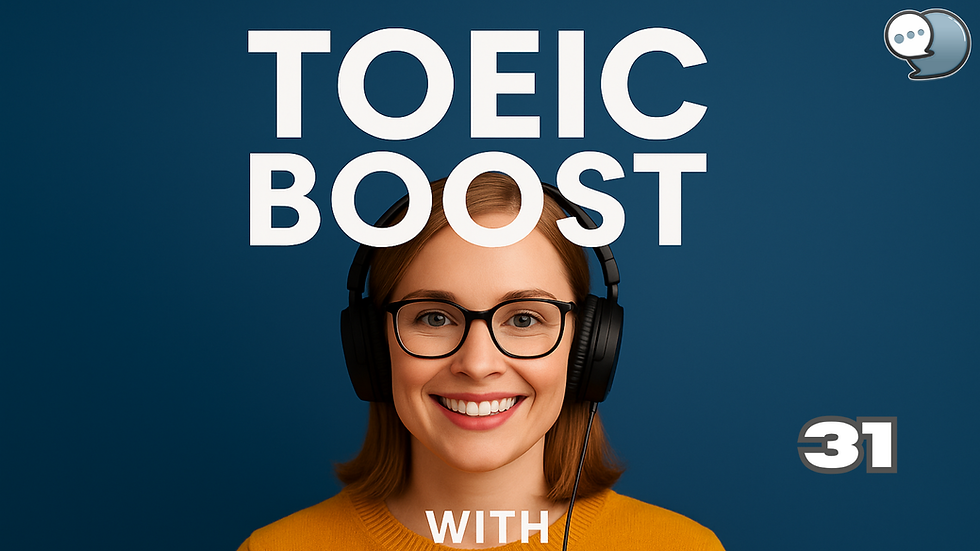Mastering Verbs and Tenses for TOEIC Success Insights from Episode 31
- internchatstick
- Jul 21
- 3 min read

As the TOEIC exam continues to be a key assessment for non-native English speakers, understanding grammar is essential. In Episode 31 of our podcast, we dive into the world of verbs and tenses, focusing on how to confidently handle past, present, future, and perfect tenses. This blog post highlights crucial insights from the episode that will aid your preparation for TOEIC success.
Understanding the Importance of Verbs and Tenses
Verbs are the backbone of any sentence. They express actions, occurrences, or states of being, and the way we use them can dramatically change sentence meaning. For TOEIC test-takers, mastering various tenses is crucial for effective English communication.
Understanding verb forms is essential for the TOEIC exam, which evaluates candidates on various grammar skills. Notably, around 20% of the TOEIC listening and reading sections focus on correct verb tense usage. This knowledge not only enhances your test performance but also strengthens your overall linguistic abilities.
Exploring Tenses: Past, Present, and Future
Each tense serves a unique purpose and clearly defines when an action occurs.
Past Tense
We use the past tense to describe actions that have already happened. By using verbs correctly, you can convey precise timelines. For example, "I walked to the store" shows a completed action, while "I was walking to the store" highlights that the action was ongoing at some point in the past.
Test-takers can expect questions that require them to identify these nuances. For instance, recalling that about 30% of grammar questions on TOEIC involve past tense usage is a good strategy.
Present Tense
The present tense is used for habitual actions or current states. There are three main forms: simple, continuous, and perfect. A simple present statement like "He reads every day" suggests routine, while "He is reading now" indicates an action currently in progress.
Recognizing these forms is critical for TOEIC preparation. Study materials often emphasize that nearly 25% of questions assess the present tense and its various forms.
Future Tense
The future tense describes actions that will happen. Familiarity with forms like "will" and "going to" is vital. For example, "I will visit my friends tomorrow" suggests a simple prediction, while "I am going to visit my friends tomorrow" describes a planned action.
Understanding these distinctions helps candidates choose correct answers on the TOEIC exam, where future tense questions frequently appear.
Perfect Tenses: Present, Past, and Future
Perfect tenses can be complex but are essential for distinguishing timing.
Present Perfect Tense
The present perfect tense is used when an action has happened at an unspecified time before now. For instance, "I have seen that movie" implies experience. In TOEIC, recognizing this tense is important as it can relate to how past experiences impact the present.
Past Perfect Tense
The past perfect tense shows an action completed before another past event. An example would be, "I had finished my homework before dinner," which clarifies the order of actions. This clarity is crucial for answering precise questions on the TOEIC.
Future Perfect Tense
The future perfect tense indicates that an action will be completed before a specific time in the future. For example, "I will have graduated by next year" illustrates this concept well. Understanding the future perfect tense can distinguish candidates in TOEIC assessments, as it requires a solid grasp of action relationships across different times.
The TOEIC Exam Format and Testing of Verbs
Familiarity with how these verb forms are tested on the TOEIC is crucial for preparation. Each section presents questions focusing on tense usage. Whether in listening or reading comprehension, candidates face multiple-choice questions requiring the selection of the correct verb form based on provided sentence structures.
The podcast emphasizes practicing these verb forms through targeted exercises. Engaging with a variety of contexts will boost both recognition and practical application.
Practical Tips for Mastery
Regular Practice: Work on exercises focused on verb tenses to improve recognition and proper usage.
Contextual Learning: Read widely in English, noting how different tenses are used. For example, novels, articles, and business reports all showcase varied tense forms.
Utilize Online Resources: Many websites offer free quizzes and interactive activities to enhance verb usage, which can be particularly useful for TOEIC preparation.
Listening Exercises: Regularly listening to native speakers, whether through podcasts or videos, can help you internalize natural tense usage.
Group Study: Collaborate with peers to discuss and understand tenses together, reinforcing your learning in a social setting.
Embarking on Your TOEIC Journey
Mastering verbs and tenses is essential for anyone aiming to excel on the TOEIC exam. As highlighted in Episode 31 of the podcast, a firm grasp of these grammar fundamentals will significantly boost your English proficiency.
Understanding the nuances of past, present, future, and perfect tenses can improve your test performance and make you a more effective communicator in English.
Prepare with dedication, embrace each challenge, and through consistent practice, you'll pave your way to success in the TOEIC exam.






Comments